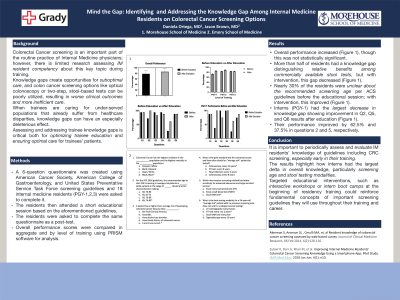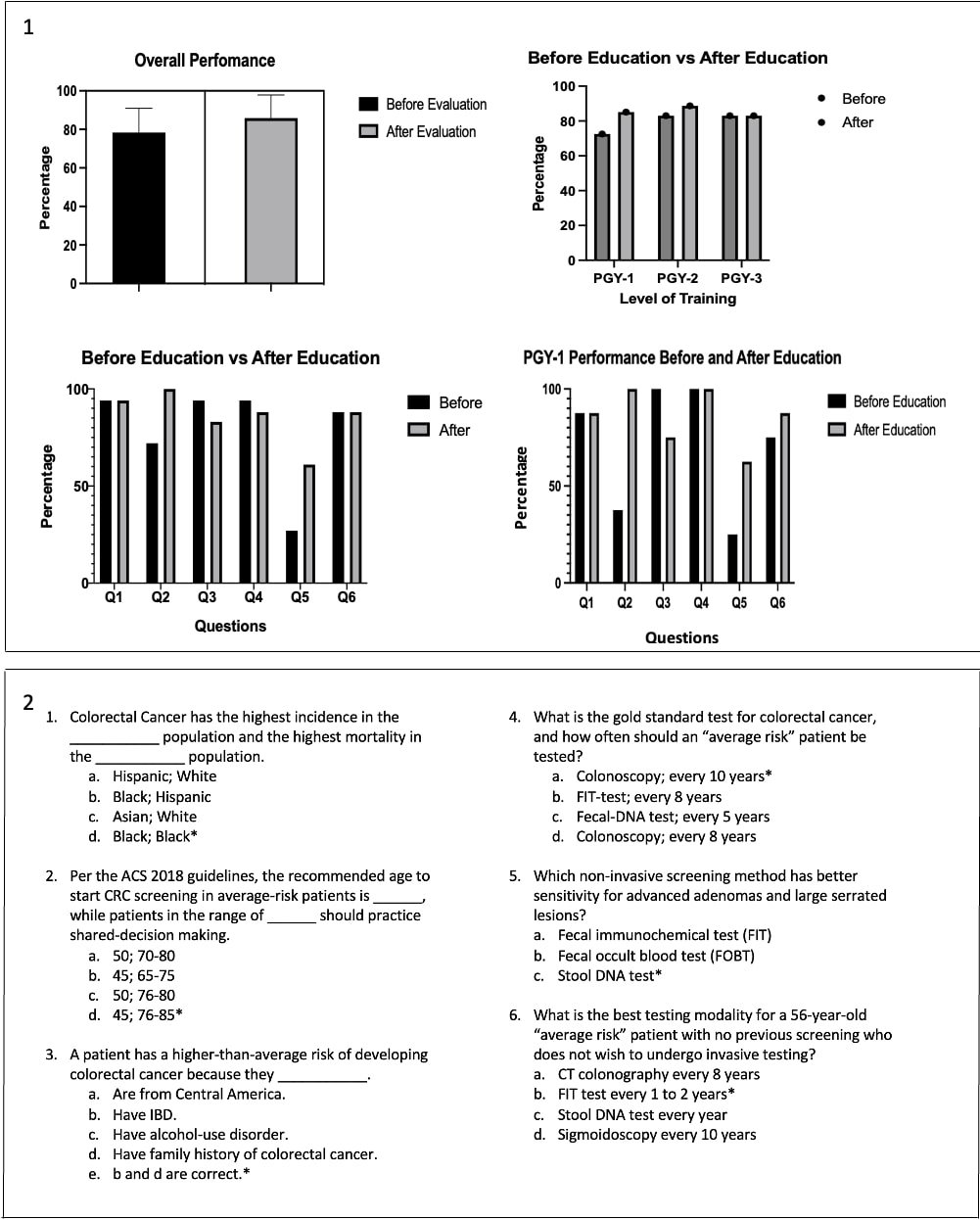Monday Poster Session
Category: Colorectal Cancer Prevention
P2157 - Mind the Gap: Identifying and Addressing the Knowledge Gap Among Internal Medicine Residents on Colorectal Cancer Screening Options
Monday, October 28, 2024
10:30 AM - 4:00 PM ET
Location: Exhibit Hall E

Has Audio
- DO
Daniela Ortega, MD
Morehouse School of Medicine
Atlanta, GA
Presenting Author(s)
Daniela Ortega, MD1, Jason Brown, MD2
1Morehouse School of Medicine, Atlanta, GA; 2Emory University School of Medicine, Atlanta, GA
Introduction: Colorectal Cancer screening is an important part of the routine practice of Internal Medicine physicians; however, there is limited research assessing IM resident competency about this key topic during training. Knowledge gaps create opportunities for suboptimal care, and colon cancer screening options like optical colonoscopy or two-step, stool-based tests can be poorly utilized, resulting in worse clinical outcomes and more inefficient care. When trainees are caring for under-served populations that already suffer from healthcare disparities, knowledge gaps can have an especially deleterious effect. Assessing and addressing trainee knowledge gaps is critical both for optimizing trainee education and ensuring optimal care for trainees’ patients.
Methods: A 6-question questionnaire was created using American Cancer Society, American College of Gastroenterology, and United States Preventative Service Task Force screening guidelines and 18 internal medicine residents (PGY-1,2,3) were asked to complete it. The residents then attended a short educational session based on the aforementioned guidelines. The residents were asked to complete the same questionnaire as a post-test. Overall performance scores were compared in aggregate and by level of training using PRISM software for analysis.
Results: Overall performance increased (Figure 1), though this was not statistically significant. More than half of residents had a knowledge gap distinguishing relative benefits among commercially available stool tests, but with intervention, this gap decreased (Figure 1). Nearly 30% of the residents were unclear about recommended screening age per ACS guidelines before the educational session; with intervention, this improved (Figure 1). Interns (PGY-1) had the largest decrease in knowledge gap showing improvement in Q2, Q5, and Q6 results after education (Figure 1). Their performance improved by 62.5% and 37.5% in questions 2 and 5, respectively.
Discussion: It is important to periodically assess and evaluate Internal Medicine residents’ knowledge of guidelines including CRC screening, especially early in their training. The results highlight how interns had the largest delta in overall knowledge, particularly screening age and stool testing modalities. Targeted educational interventions, such as interactive workshops or intern boot camps at the beginning of residency training could reinforce fundamental concepts of important screening guidelines they will use throughout their training and career.

Disclosures:
Daniela Ortega, MD1, Jason Brown, MD2. P2157 - Mind the Gap: Identifying and Addressing the Knowledge Gap Among Internal Medicine Residents on Colorectal Cancer Screening Options, ACG 2024 Annual Scientific Meeting Abstracts. Philadelphia, PA: American College of Gastroenterology.
1Morehouse School of Medicine, Atlanta, GA; 2Emory University School of Medicine, Atlanta, GA
Introduction: Colorectal Cancer screening is an important part of the routine practice of Internal Medicine physicians; however, there is limited research assessing IM resident competency about this key topic during training. Knowledge gaps create opportunities for suboptimal care, and colon cancer screening options like optical colonoscopy or two-step, stool-based tests can be poorly utilized, resulting in worse clinical outcomes and more inefficient care. When trainees are caring for under-served populations that already suffer from healthcare disparities, knowledge gaps can have an especially deleterious effect. Assessing and addressing trainee knowledge gaps is critical both for optimizing trainee education and ensuring optimal care for trainees’ patients.
Methods: A 6-question questionnaire was created using American Cancer Society, American College of Gastroenterology, and United States Preventative Service Task Force screening guidelines and 18 internal medicine residents (PGY-1,2,3) were asked to complete it. The residents then attended a short educational session based on the aforementioned guidelines. The residents were asked to complete the same questionnaire as a post-test. Overall performance scores were compared in aggregate and by level of training using PRISM software for analysis.
Results: Overall performance increased (Figure 1), though this was not statistically significant. More than half of residents had a knowledge gap distinguishing relative benefits among commercially available stool tests, but with intervention, this gap decreased (Figure 1). Nearly 30% of the residents were unclear about recommended screening age per ACS guidelines before the educational session; with intervention, this improved (Figure 1). Interns (PGY-1) had the largest decrease in knowledge gap showing improvement in Q2, Q5, and Q6 results after education (Figure 1). Their performance improved by 62.5% and 37.5% in questions 2 and 5, respectively.
Discussion: It is important to periodically assess and evaluate Internal Medicine residents’ knowledge of guidelines including CRC screening, especially early in their training. The results highlight how interns had the largest delta in overall knowledge, particularly screening age and stool testing modalities. Targeted educational interventions, such as interactive workshops or intern boot camps at the beginning of residency training could reinforce fundamental concepts of important screening guidelines they will use throughout their training and career.

Figure: Figure 1: Pre-test and Post-test performance; aggregated, by level of training, and per-question.
Figure 2: Questionnaire used for pre- and post-test.
Figure 2: Questionnaire used for pre- and post-test.
Disclosures:
Daniela Ortega indicated no relevant financial relationships.
Jason Brown indicated no relevant financial relationships.
Daniela Ortega, MD1, Jason Brown, MD2. P2157 - Mind the Gap: Identifying and Addressing the Knowledge Gap Among Internal Medicine Residents on Colorectal Cancer Screening Options, ACG 2024 Annual Scientific Meeting Abstracts. Philadelphia, PA: American College of Gastroenterology.
